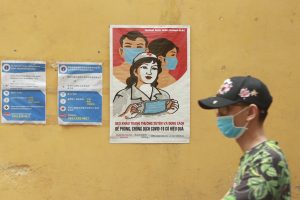How does one go about speaking out in a one-party communist state? As Benedict J. Tria Kerkvliet explored in his book Speaking Out in Vietnam: Public Political Criticism in a Communist Party-Ruled Nation, published last year, while Vietnamese citizens rarely voiced public discontent until the 1990s, in the decades since and with the explosion of internet access, more Vietnamese have found ways to be heard. Contrary to simplistic views of the country’s political arrangement, the state has handled its critics in various ways ranging from responsiveness to toleration to repression.
In a recent interview with The Diplomat, Kerkvliet, an Emeritus Professor at The Australian National University and an Affiliate Graduate Faculty member at the University of Hawai’i, discussed how speaking out fits into Vietnam’s political system and the country’s response to the coronavirus pandemic, for which it has garnered much praise.
For those “speaking out” in Vietnam, what avenues exist to influence state behavior and what topics bring people either to the streets or to the social media public square to voice their concerns and opinions?
Until the early 1990s, Vietnamese citizens rarely openly expressed their discontent about political matters. They whispered their criticisms to confidants and did things surreptitiously to avoid reprimands that could include imprisonment. Such everyday disapproval and resistance continues, but in addition, Vietnamese people since the mid 1990s have been speaking out publicly to such a degree that it has become a prominent feature of Vietnam’s political landscape.
Public criticism ranges from lambasting corrupt authorities to opposing the political system, from condemning repression against bloggers to resisting land confiscations, from demanding decent working conditions to questioning the state’s foreign policies, from protesting police brutality to decrying state interference in private religious affairs. The citizens speaking out are also diverse: rural villagers, urban workers, religious groups, intellectuals, students, environmental activists, members of professional associations, and former (even some current) government and Vietnamese Communist Party (VCP) officials. They voice discontent and propose solutions through numerous methods: strikes at factories; demonstrations at government offices; marches along provincial roads and urban streets; petitions with hundreds, even thousands of signatures; letters, phone calls, and text messages; videos, photos, and documents posted on websites; and online newspapers. Often they ask lawyers and journalists to assist their causes.
Public political criticism has emerged and expanded because aggravated people are anxious to be heard. And making that more possible has been the rapid spread and accessibility to most Vietnamese citizens of the internet and mobile phones. Women and men, young and old, rural dwellers and urbanites – all can fairly readily and cheaply text, phone, blog, and post on websites their grievances, make claims, announce demonstrations, describe protest marches, circulate petitions, and do other things to convey their concerns far and wide.
State authorities have dealt with critics with a combination of responsiveness, toleration, and repression. Indeed, one important reason why public political criticism has grown is authorities have been unable and to a degree unwilling to stifle it. Concerted, extremely aggressive campaigns to halt all political criticism would greatly risk an economic and political crisis that would create even more discontent and greater challenges to VCP rule.
Besides, many authorities take rather seriously the idea that the government is “of the people, for the people, and by the people,” an ubiquitous official motto that is more than a slogan. To maintain political, social, and economic order, authorities listen, at least to an extent. They frequently tolerate, even accommodate some of citizens’ criticisms. For example, authorities often side with striking workers. Officials have frequently found that villagers’ complaints against corruption and land confiscations are valid. Authorities have revised labor and land laws to meet some of workers and farmers’ concerns. Officials have countenanced demonstrations and other forms of protest against China and Vietnam-China relations. They have tolerated a number of individuals who advocate democratization.
The points at which authorities’ reactions became repressive vary with the issue and type of political activity. For labor, that point comes when workers try to form their own unions. Regarding land, authorities use police to evict people after disputes have persisted for several years and to disperse large demonstrations. Toward protests against China and Vietnam-China relations, authorities resort to intimidation and repression when demonstrations become lengthy, threaten to grow nationwide, or defy orders explicitly prohibiting them. Against those championing democratization, authorities use intimidation, threats, and detention. They have also imprisoned many democratization advocates, although not all.

































